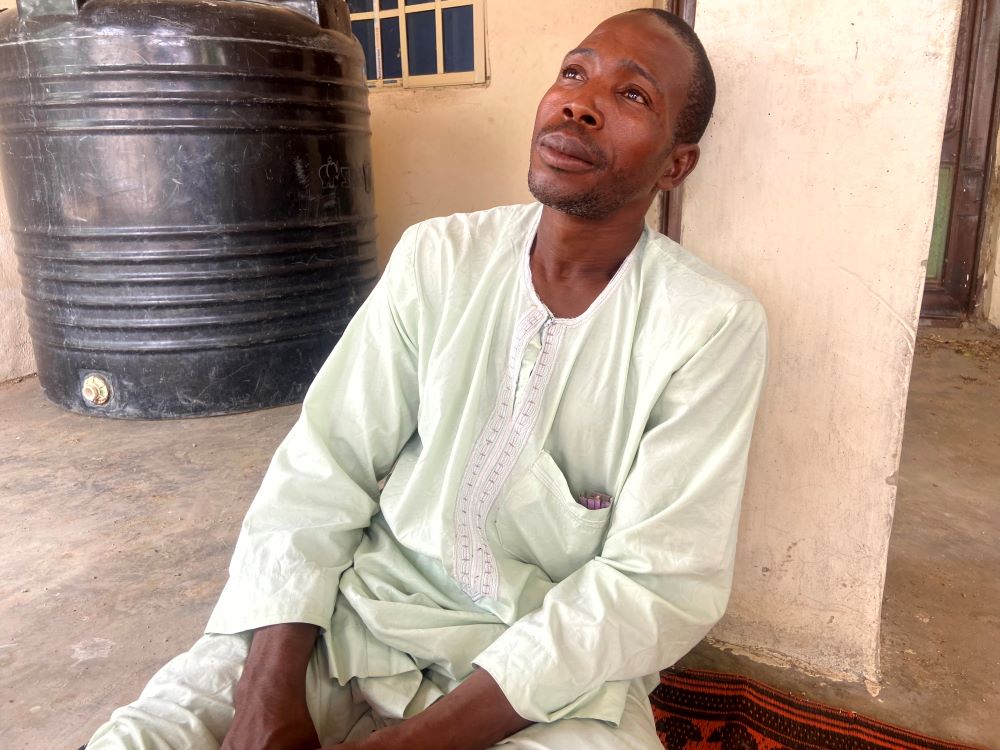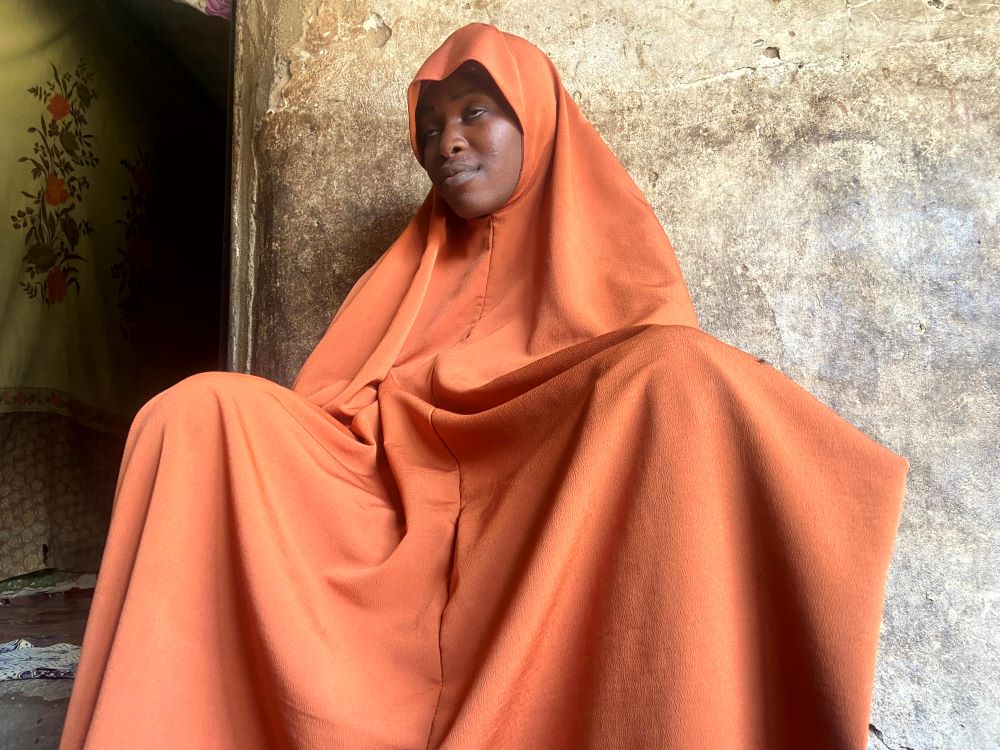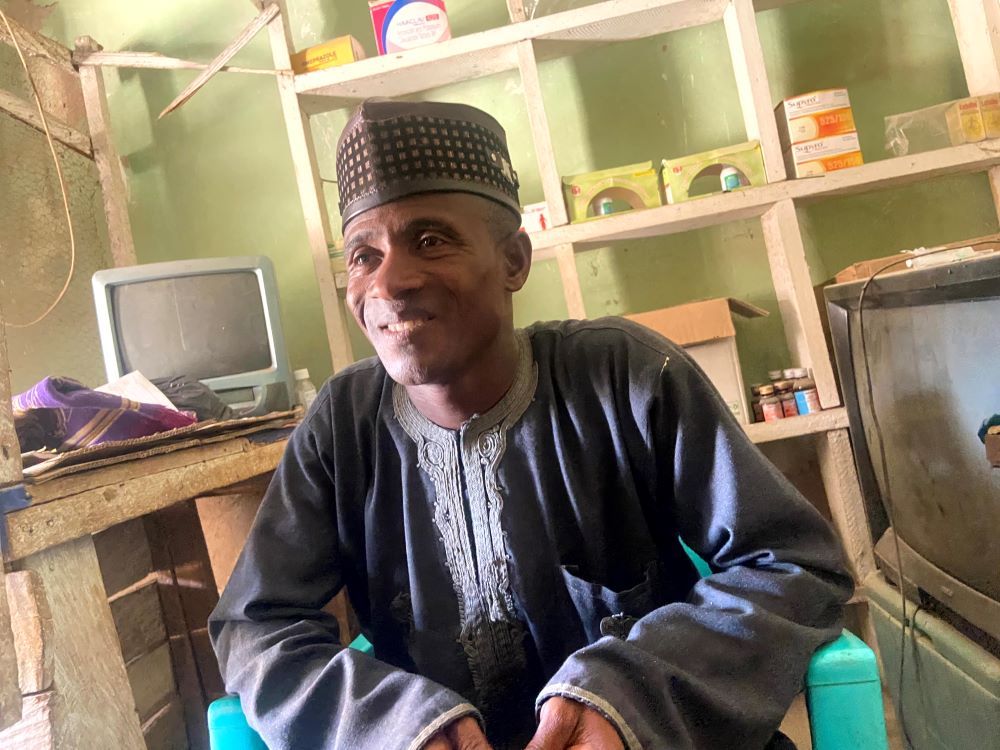Without help from the government, many Nigerians in communities in states in Northwest Nigeria are succumbing to the rule of criminal gangs known as bandits, who not only impose levies and other dues on them but also force them to work for free in farmlands. The residents acquiesce in exchange for peace, which still eludes them. ABIODUN JAMIU, who visited some of the affected communities in the Northwest, tells the unbelievable harrowing tales of these helpless and hapless Nigerians.
Sponsored Images




Abubakar Abdullahi’s words trail off as he cringes with unspoken despair that will scar him for a lifetime. One evening in April last year, the 45-year-old was taking his students in an Islamic school in Magazu when criminal gangs, locally known as bandits, raided the remote community in Zamfara, Northwest Nigeria.
He has witnessed many such attacks, leaving pints of grief and pain behind, but that day was different. It struck a part that left him trembling.
Before the conflict that brought the hurricane down to his doorstep sprawled across the region, Abubakar took pride in his work as a farmer and would occasionally relive the good old days every minute into his conversation with The ICIR – when he used to take his farm produce to neighbouring towns.
“Allah has a way of testing his people and would not burden us beyond what we can bear,” he started philosophically. “We used to sell to people from Funtua, Tsafe, and things were good until the boys came with guns, killing people and burning houses.”
The killing spree snakes into farmlands and immediately become the shadow of death. No farmers, including Abubakar, could access their farms for fear of being attacked or kidnapped. And the tiny thread he was holding onto, teaching young children in the evening, was now being threatened following incessant raids that left the village deserted.
Like everyone in the region, Abubakar had had enough, but he was unsure of the future for himself and his eighteen children. The next morning, he left his village for Tsafe, some 4.5 kilometres away, where he and some of his family stayed with relatives while others went to the local government headquarters, Tsafe, to seek refuge.
“Eating was a nightmare for us, even for our host too. But we have nowhere else to go. They (bandits) stopped us from going to our farms and markets, and now to live in peace is a luxury not many can afford,” he said pointedly.
Eating was a nightmare for us, even for our host too. But we have nowhere else to go. They (bandits) stopped us from going to our farms and markets, and now to live in peace is a luxury not many can afford.
In Nigeria’s Northwest, banditry is rife.
For nearly over a decade, criminal gangs have become a constant threat, killing more than 12,000 people and even injuring more, according to a report [PDF] by Abuja-based policy think tank, Centre for Democracy and Development (CDD). This also includes some 605,505 locals who have been displaced as they raid villages, impose levies on communities and repeatedly even kidnap minors for ransom.
Between July 2021 and June 2022, no fewer than 2,186 people were abducted in the region out of 3,420 kidnapped across the country. During this period, available data shows, a whopping ₦6.531 billion was demanded in exchange for the release of captives, while a fraction of that sum (₦653.7 million) was paid as ransom.

There are believed to be as many as 120 gangs with over 30,000 militants across the northwestern states of Sokoto, Zamfara, Katsina, Kebbi and Kaduna. They comprise mostly ethnic Fulani and mercenaries from other criminal groups and ethnicity.
The crisis, however, does not exist in a vacuum. It was flared [PDF], to some extent, by the farmer-herder conflict that has spiralled significantly across sub-Saharan Africa owing largely to climate change as well as the arbitrary acquisition of restricted grazing routes and reserves among politicians and traditional rulers.
It became a wildfire in later years, around 2011, as self-help militia groups like ‘Yansakai’ formed by farming communities sprang up to protect themselves against the growing tide of the conflict.
Members of Yansakai, however, indiscriminately harass, rob, and kill ordinary herders on suspicion of them being bandits, which further heightens the conflict. The conflict has now spilled into neighbouring states following military offensives in the region.
https://googleads.g.doubleclick.net/pagead/ads?client=ca-pub-3931478535803655&output=html&h=159&slotname=4345357669&adk=1495517077&adf=3376242427&pi=t.ma~as.4345357669&w=586&lmt=1687247783&rafmt=11&format=586×159&url=https%3A%2F%2Fwww.icirnigeria.org%2Fbanditry-in-zamfara-a-heavy-price-for-peace%2F&host=ca-host-pub-2644536267352236&wgl=1&uach=WyJXaW5kb3dzIiwiMTAuMC4wIiwieDg2IiwiIiwiMTE0LjAuNTczNS4xMzQiLFtdLDAsbnVsbCwiNjQiLFtbIk5vdC5BL0JyYW5kIiwiOC4wLjAuMCJdLFsiQ2hyb21pdW0iLCIxMTQuMC41NzM1LjEzNCJdLFsiR29vZ2xlIENocm9tZSIsIjExNC4wLjU3MzUuMTM0Il1dLDBd&dt=1687378041692&bpp=5&bdt=75734&idt=5&shv=r20230620&mjsv=m202306160701&ptt=9&saldr=aa&abxe=1&cookie=ID%3De4bda5aeb7ddd958-22efd97127e00052%3AT%3D1685596888%3ART%3D1687377978%3AS%3DALNI_MZsNItbyYFz9TMcEIVo7uayv4M5YA&gpic=UID%3D00000c3a783a8050%3AT%3D1685596888%3ART%3D1687377978%3AS%3DALNI_MYfv-mMGJCPEeZ4m-z3mCM2s6g-VA&prev_fmts=0x0%2C283x600%2C300x300%2C300x300%2C586x159%2C300x300%2C300x300%2C586x159%2C310x800%2C586x159&nras=1&correlator=6371480156603&frm=20&pv=1&ga_vid=1439723367.1685596885&ga_sid=1687377977&ga_hid=829045726&ga_fc=1&u_tz=-420&u_his=3&u_h=800&u_w=1280&u_ah=760&u_aw=1280&u_cd=24&u_sd=1&dmc=4&adx=331&ady=4566&biw=1247&bih=575&scr_x=0&scr_y=4019&eid=44759927%2C44759837%2C44759876%2C31075431%2C31075465%2C31075471%2C44772269%2C44788442%2C44794789&oid=2&psts=ABHeCviumkBrO9RBLiiwloCkJQhFmQV71vtFO2GYP-9DRnSrXihHsWs19r_GDh3zrURVuN-A_8TaHVxA9r6ZyPk75N0LCvg%2CABHeCvhUSoVgOwu3Ij8jH6B6-rhvlM93OtIZYH5I2AlURXSTjFvfbFL2QJvabEaIS15iHswOqS6oiLmDr73BtKrE-kdWyA%2CABHeCvhuewEOvdFXYZdye5Ze-0L73GYYK0YoPw2jz9g69sEG6XQzc6Q_kfDtAuuNblnrBa_YwQ9ST3qBrhxMV1lppDL_tQ%2CABHeCvjlfXiwpufztUJKjX4cM7NjG5l5CH8P6gAKur4zAvIcxau4c-i41MXK9zMp-_dMo2ark87-QuAduyHhd_9LtfF3Tw%2CABHeCvhfjGTp3tAB4TCwr9y6BFA2XQFlkKk5Oln5_81kiySDssQ6rB8hLUyt70g5UiAZj3jfuOSKddqvwonxyPQhC6rFcfRg%2CABHeCviniVicSNv8EVoFZC0-UTyHhUvGQ4MqurTV-nmvijMppM8R-HiJhzkWVbXN6JhcN12hZKhPbnruFKz9ezGg-JPSfQ%2CABHeCviARPMb4eRS9V_9xs_sWIz6-hCg8cme6dObhFStPTqjZ2sj_9EWGwGW9pIK2dRqr5ANoMQVPqOD_XnMOx7oguD2yLB_%2CABHeCviVopnIOuDYROQ2_FmDyFZLj-bmYrT3BlXTyMRqUPmAJ01u5O-U1czn85hURqjrBVbY0SOew0PNts5SKTX3DRXh-D4Upq9qOCKuzMG1vxy54-raYZEgsjH9hS–zKMzZiVeR_bN_I-F6Sk0jBvRUhYsJ3as6qECHxmQ8pSGSZKfxo1hh9sVBEkUX4hPtQU52Tu-L325gNmqH9bDhpfYfmuWU4fuQgdgVsGmtDIZRsaRRg7Ps8AGa9Ecmcsb5lnvSJIxJBZFq10fjlmN4JEiXgTuMoOvIlnjV0B7FpN3xBd09Zci2DR2fnp2e1yQWdiLVfhciXDZYQAvr9Eal6kanMSaXpZkwg%2CABHeCviMA2SHc2k56lj4AOv2InqjeLF56icSbM7ShBfK2dSOk7y7oH6_302_m8gfKrCP36kCEI_4wfftczHhu8BcmXsdhu7g&pvsid=3711765199708166&tmod=930139517&uas=3&nvt=1&ref=https%3A%2F%2Fwww.google.com%2F&fc=1920&brdim=0%2C0%2C0%2C0%2C1280%2C0%2C1280%2C760%2C1264%2C575&vis=1&rsz=%7C%7CoeE%7C&abl=CS&pfx=0&fu=128&bc=31&ifi=12&uci=a!c&fsb=1&xpc=uM5zEp5Q9r&p=https%3A//www.icirnigeria.org&dtd=23
Unfortunately, as banditry continues to rise in the region, some of the hardest-hit communities are now offering major sacrifices: they now club together to pay protection levy, and live under the terrorists’ harsh law, just so they could buy their safety, a radical step analysts pointed out is a big disconnect between the rhetoric of the authorities and the reality at the local level.
The government has always maintained that it has decimated the gangs and sanctioned measures that include labelling them as terrorists and outlawing the payment of ransom.
This, however, has not in any way significantly calmed the tide of the conflict as the gangs continue to firm their grip on rural communities, exercising de facto authority.
A call of duty – working for bandits –
Abubakar sat on a wooden chair, munching kola nuts as he handed over the remaining lobes to the grey-haired man to his far right. They had just learnt that bandit kingpin, Ado Aliero, had sent messages to communities, including Magazu, requesting farm hands as part of the peace deal he had with elders in the axis. They were to work on his farm for a number of days, or there would be a heavy price to pay.
https://googleads.g.doubleclick.net/pagead/ads?client=ca-pub-3931478535803655&output=html&h=159&slotname=4345357669&adk=3372178862&adf=2038819928&pi=t.ma~as.4345357669&w=586&lmt=1687247783&rafmt=11&format=586×159&url=https%3A%2F%2Fwww.icirnigeria.org%2Fbanditry-in-zamfara-a-heavy-price-for-peace%2F&host=ca-host-pub-2644536267352236&wgl=1&uach=WyJXaW5kb3dzIiwiMTAuMC4wIiwieDg2IiwiIiwiMTE0LjAuNTczNS4xMzQiLFtdLDAsbnVsbCwiNjQiLFtbIk5vdC5BL0JyYW5kIiwiOC4wLjAuMCJdLFsiQ2hyb21pdW0iLCIxMTQuMC41NzM1LjEzNCJdLFsiR29vZ2xlIENocm9tZSIsIjExNC4wLjU3MzUuMTM0Il1dLDBd&dt=1687378046746&bpp=7&bdt=80788&idt=7&shv=r20230620&mjsv=m202306160701&ptt=9&saldr=aa&abxe=1&cookie=ID%3De4bda5aeb7ddd958-22efd97127e00052%3AT%3D1685596888%3ART%3D1687377978%3AS%3DALNI_MZsNItbyYFz9TMcEIVo7uayv4M5YA&gpic=UID%3D00000c3a783a8050%3AT%3D1685596888%3ART%3D1687377978%3AS%3DALNI_MYfv-mMGJCPEeZ4m-z3mCM2s6g-VA&prev_fmts=0x0%2C283x600%2C300x300%2C300x300%2C586x159%2C300x300%2C300x300%2C586x159%2C310x800%2C586x159%2C586x159&nras=1&correlator=6371480156603&frm=20&pv=1&ga_vid=1439723367.1685596885&ga_sid=1687377977&ga_hid=829045726&ga_fc=1&u_tz=-420&u_his=3&u_h=800&u_w=1280&u_ah=760&u_aw=1280&u_cd=24&u_sd=1&dmc=4&adx=331&ady=5537&biw=1247&bih=575&scr_x=0&scr_y=4990&eid=44759927%2C44759837%2C44759876%2C31075431%2C31075465%2C31075471%2C44772269%2C44788442%2C44794789&oid=2&psts=ABHeCviumkBrO9RBLiiwloCkJQhFmQV71vtFO2GYP-9DRnSrXihHsWs19r_GDh3zrURVuN-A_8TaHVxA9r6ZyPk75N0LCvg%2CABHeCvhUSoVgOwu3Ij8jH6B6-rhvlM93OtIZYH5I2AlURXSTjFvfbFL2QJvabEaIS15iHswOqS6oiLmDr73BtKrE-kdWyA%2CABHeCvhuewEOvdFXYZdye5Ze-0L73GYYK0YoPw2jz9g69sEG6XQzc6Q_kfDtAuuNblnrBa_YwQ9ST3qBrhxMV1lppDL_tQ%2CABHeCvjlfXiwpufztUJKjX4cM7NjG5l5CH8P6gAKur4zAvIcxau4c-i41MXK9zMp-_dMo2ark87-QuAduyHhd_9LtfF3Tw%2CABHeCvhfjGTp3tAB4TCwr9y6BFA2XQFlkKk5Oln5_81kiySDssQ6rB8hLUyt70g5UiAZj3jfuOSKddqvwonxyPQhC6rFcfRg%2CABHeCviniVicSNv8EVoFZC0-UTyHhUvGQ4MqurTV-nmvijMppM8R-HiJhzkWVbXN6JhcN12hZKhPbnruFKz9ezGg-JPSfQ%2CABHeCviARPMb4eRS9V_9xs_sWIz6-hCg8cme6dObhFStPTqjZ2sj_9EWGwGW9pIK2dRqr5ANoMQVPqOD_XnMOx7oguD2yLB_%2CABHeCviVopnIOuDYROQ2_FmDyFZLj-bmYrT3BlXTyMRqUPmAJ01u5O-U1czn85hURqjrBVbY0SOew0PNts5SKTX3DRXh-D4Upq9qOCKuzMG1vxy54-raYZEgsjH9hS–zKMzZiVeR_bN_I-F6Sk0jBvRUhYsJ3as6qECHxmQ8pSGSZKfxo1hh9sVBEkUX4hPtQU52Tu-L325gNmqH9bDhpfYfmuWU4fuQgdgVsGmtDIZRsaRRg7Ps8AGa9Ecmcsb5lnvSJIxJBZFq10fjlmN4JEiXgTuMoOvIlnjV0B7FpN3xBd09Zci2DR2fnp2e1yQWdiLVfhciXDZYQAvr9Eal6kanMSaXpZkwg%2CABHeCviMA2SHc2k56lj4AOv2InqjeLF56icSbM7ShBfK2dSOk7y7oH6_302_m8gfKrCP36kCEI_4wfftczHhu8BcmXsdhu7g%2CABHeCvjc8Kakip-5kgtMygZSe9w6H59Hk-W0cmPLJa5C5wNVZXuTkRluZHAHIl6ow1PK-gI4LDqRIyAB9H2zPZkBQaM5cBRO&pvsid=3711765199708166&tmod=930139517&uas=3&nvt=1&ref=https%3A%2F%2Fwww.google.com%2F&fc=1920&brdim=0%2C0%2C0%2C0%2C1280%2C0%2C1280%2C760%2C1264%2C575&vis=1&rsz=%7C%7CoeE%7C&abl=CS&pfx=0&fu=128&bc=31&ifi=13&uci=a!d&fsb=1&xpc=RZHnA8AREY&p=https%3A//www.icirnigeria.org&dtd=32
He was ready to be there.
“When I got the news, I was glad. At least we’re getting somewhere. The light I was waiting for was finally here. I took it as a mandatory assignment to do for peace to reign in our community, considering the number of people who had suffered from their attacks,” Abubakar stated as he relayed his time on the bandits’ farm with 150 other members of the community at gunpoint.
“We’re guarded by their boys throughout our stay. Later on, they would bring cow milk for us to drink as we work for them in batches; some from 8.00 a.m. to 2.00 pm while others from 2.00 p.m. to 7.00 pm,” he recalled.
Of course, the communities were left off the hook for a few weeks. Magazu returned to life too.
https://googleads.g.doubleclick.net/pagead/ads?client=ca-pub-3931478535803655&output=html&h=159&slotname=4345357669&adk=3319951402&adf=40547734&pi=t.ma~as.4345357669&w=586&lmt=1687247783&rafmt=11&format=586×159&url=https%3A%2F%2Fwww.icirnigeria.org%2Fbanditry-in-zamfara-a-heavy-price-for-peace%2F&host=ca-host-pub-2644536267352236&wgl=1&uach=WyJXaW5kb3dzIiwiMTAuMC4wIiwieDg2IiwiIiwiMTE0LjAuNTczNS4xMzQiLFtdLDAsbnVsbCwiNjQiLFtbIk5vdC5BL0JyYW5kIiwiOC4wLjAuMCJdLFsiQ2hyb21pdW0iLCIxMTQuMC41NzM1LjEzNCJdLFsiR29vZ2xlIENocm9tZSIsIjExNC4wLjU3MzUuMTM0Il1dLDBd&dt=1687378049918&bpp=6&bdt=83961&idt=6&shv=r20230620&mjsv=m202306160701&ptt=9&saldr=aa&abxe=1&cookie=ID%3De4bda5aeb7ddd958-22efd97127e00052%3AT%3D1685596888%3ART%3D1687377978%3AS%3DALNI_MZsNItbyYFz9TMcEIVo7uayv4M5YA&gpic=UID%3D00000c3a783a8050%3AT%3D1685596888%3ART%3D1687377978%3AS%3DALNI_MYfv-mMGJCPEeZ4m-z3mCM2s6g-VA&prev_fmts=0x0%2C283x600%2C300x300%2C300x300%2C586x159%2C300x300%2C300x300%2C586x159%2C310x800%2C586x159%2C586x159%2C586x159&nras=1&correlator=6371480156603&frm=20&pv=1&ga_vid=1439723367.1685596885&ga_sid=1687377977&ga_hid=829045726&ga_fc=1&u_tz=-420&u_his=3&u_h=800&u_w=1280&u_ah=760&u_aw=1280&u_cd=24&u_sd=1&dmc=4&adx=331&ady=6254&biw=1247&bih=575&scr_x=0&scr_y=5707&eid=44759927%2C44759837%2C44759876%2C31075431%2C31075465%2C31075471%2C44772269%2C44788442%2C44794789&oid=2&psts=ABHeCviumkBrO9RBLiiwloCkJQhFmQV71vtFO2GYP-9DRnSrXihHsWs19r_GDh3zrURVuN-A_8TaHVxA9r6ZyPk75N0LCvg%2CABHeCvhUSoVgOwu3Ij8jH6B6-rhvlM93OtIZYH5I2AlURXSTjFvfbFL2QJvabEaIS15iHswOqS6oiLmDr73BtKrE-kdWyA%2CABHeCvhuewEOvdFXYZdye5Ze-0L73GYYK0YoPw2jz9g69sEG6XQzc6Q_kfDtAuuNblnrBa_YwQ9ST3qBrhxMV1lppDL_tQ%2CABHeCvjlfXiwpufztUJKjX4cM7NjG5l5CH8P6gAKur4zAvIcxau4c-i41MXK9zMp-_dMo2ark87-QuAduyHhd_9LtfF3Tw%2CABHeCvhfjGTp3tAB4TCwr9y6BFA2XQFlkKk5Oln5_81kiySDssQ6rB8hLUyt70g5UiAZj3jfuOSKddqvwonxyPQhC6rFcfRg%2CABHeCviniVicSNv8EVoFZC0-UTyHhUvGQ4MqurTV-nmvijMppM8R-HiJhzkWVbXN6JhcN12hZKhPbnruFKz9ezGg-JPSfQ%2CABHeCviARPMb4eRS9V_9xs_sWIz6-hCg8cme6dObhFStPTqjZ2sj_9EWGwGW9pIK2dRqr5ANoMQVPqOD_XnMOx7oguD2yLB_%2CABHeCviVopnIOuDYROQ2_FmDyFZLj-bmYrT3BlXTyMRqUPmAJ01u5O-U1czn85hURqjrBVbY0SOew0PNts5SKTX3DRXh-D4Upq9qOCKuzMG1vxy54-raYZEgsjH9hS–zKMzZiVeR_bN_I-F6Sk0jBvRUhYsJ3as6qECHxmQ8pSGSZKfxo1hh9sVBEkUX4hPtQU52Tu-L325gNmqH9bDhpfYfmuWU4fuQgdgVsGmtDIZRsaRRg7Ps8AGa9Ecmcsb5lnvSJIxJBZFq10fjlmN4JEiXgTuMoOvIlnjV0B7FpN3xBd09Zci2DR2fnp2e1yQWdiLVfhciXDZYQAvr9Eal6kanMSaXpZkwg%2CABHeCviMA2SHc2k56lj4AOv2InqjeLF56icSbM7ShBfK2dSOk7y7oH6_302_m8gfKrCP36kCEI_4wfftczHhu8BcmXsdhu7g%2CABHeCvjc8Kakip-5kgtMygZSe9w6H59Hk-W0cmPLJa5C5wNVZXuTkRluZHAHIl6ow1PK-gI4LDqRIyAB9H2zPZkBQaM5cBRO%2CABHeCvhCBsFO7mvzwQ8O1ujhxd4G7KAp5EGq6RVgC4JDWfaRNxbjmXCSfVJ9BuU3G9xm7BmCpQ9CzDGpEi57B8eeDd8Qnr2P&pvsid=3711765199708166&tmod=930139517&uas=3&nvt=1&ref=https%3A%2F%2Fwww.google.com%2F&fc=1920&brdim=0%2C0%2C0%2C0%2C1280%2C0%2C1280%2C760%2C1264%2C575&vis=1&rsz=%7C%7CoeE%7C&abl=CS&pfx=0&fu=128&bc=31&ifi=14&uci=a!e&fsb=1&xpc=1ih6hdWO8T&p=https%3A//www.icirnigeria.org&dtd=30
“We did not record any attacks for some few weeks. I even called back my wives and children from Tsafe when it looked like the coast was getting clearer. Although they cannot be trusted, they are notorious for breaking agreements; that was all we had at the time,” he added.
But that did not buffer their pain for too long. The village was once again attacked in the thick of the night. But, this time, by another group of bandits. Abubakar’s two wives and three children were kidnapped. He said he had to sell his properties and seek donations from community members to raise the ransom.
“A few weeks after we worked for them, my family was kidnapped, including my two wives, three children and three sisters-in-law with their children. I had to sell some of my properties, including my motorbikes and get donations from the public for us to pay N1,850,000 (about $4,021) ransom before they were released. We also took them to the hospital for treatment for almost a week, and we spent a lot of money there.”
“That some communities in the northwest are choosing to pay off bandits or voluntarily living under their de facto authority underscores the disconnect between the rhetoric of the federal government and the reality at the local level. Whatever the government’s official policy on bandits – whether they are designated as terrorists, or enact laws that say it is illegal for people to pay ransoms to kidnappers – the fact is that people with no succour will do what they have to in order to survive,” says James Barnett, a Lagos-based researcher covering African politics and security at the U.S. think-tank the Hudson Institute.
https://googleads.g.doubleclick.net/pagead/ads?client=ca-pub-3931478535803655&output=html&h=159&slotname=4345357669&adk=661398392&adf=1623667508&pi=t.ma~as.4345357669&w=586&lmt=1687247783&rafmt=11&format=586×159&url=https%3A%2F%2Fwww.icirnigeria.org%2Fbanditry-in-zamfara-a-heavy-price-for-peace%2F&host=ca-host-pub-2644536267352236&wgl=1&uach=WyJXaW5kb3dzIiwiMTAuMC4wIiwieDg2IiwiIiwiMTE0LjAuNTczNS4xMzQiLFtdLDAsbnVsbCwiNjQiLFtbIk5vdC5BL0JyYW5kIiwiOC4wLjAuMCJdLFsiQ2hyb21pdW0iLCIxMTQuMC41NzM1LjEzNCJdLFsiR29vZ2xlIENocm9tZSIsIjExNC4wLjU3MzUuMTM0Il1dLDBd&dt=1687378057668&bpp=6&bdt=91710&idt=6&shv=r20230620&mjsv=m202306160701&ptt=9&saldr=aa&abxe=1&cookie=ID%3De4bda5aeb7ddd958-22efd97127e00052%3AT%3D1685596888%3ART%3D1687377978%3AS%3DALNI_MZsNItbyYFz9TMcEIVo7uayv4M5YA&gpic=UID%3D00000c3a783a8050%3AT%3D1685596888%3ART%3D1687377978%3AS%3DALNI_MYfv-mMGJCPEeZ4m-z3mCM2s6g-VA&prev_fmts=0x0%2C283x600%2C300x300%2C300x300%2C586x159%2C300x300%2C300x300%2C586x159%2C310x800%2C586x159%2C586x159%2C586x159%2C586x159&nras=1&correlator=6371480156603&frm=20&pv=1&ga_vid=1439723367.1685596885&ga_sid=1687377977&ga_hid=829045726&ga_fc=1&u_tz=-420&u_his=3&u_h=800&u_w=1280&u_ah=760&u_aw=1280&u_cd=24&u_sd=1&dmc=4&adx=331&ady=7450&biw=1247&bih=575&scr_x=0&scr_y=6903&eid=44759927%2C44759837%2C44759876%2C31075431%2C31075465%2C31075471%2C44772269%2C44788442%2C44794789&oid=2&psts=ABHeCviumkBrO9RBLiiwloCkJQhFmQV71vtFO2GYP-9DRnSrXihHsWs19r_GDh3zrURVuN-A_8TaHVxA9r6ZyPk75N0LCvg%2CABHeCvhUSoVgOwu3Ij8jH6B6-rhvlM93OtIZYH5I2AlURXSTjFvfbFL2QJvabEaIS15iHswOqS6oiLmDr73BtKrE-kdWyA%2CABHeCvhuewEOvdFXYZdye5Ze-0L73GYYK0YoPw2jz9g69sEG6XQzc6Q_kfDtAuuNblnrBa_YwQ9ST3qBrhxMV1lppDL_tQ%2CABHeCvjlfXiwpufztUJKjX4cM7NjG5l5CH8P6gAKur4zAvIcxau4c-i41MXK9zMp-_dMo2ark87-QuAduyHhd_9LtfF3Tw%2CABHeCvhfjGTp3tAB4TCwr9y6BFA2XQFlkKk5Oln5_81kiySDssQ6rB8hLUyt70g5UiAZj3jfuOSKddqvwonxyPQhC6rFcfRg%2CABHeCviniVicSNv8EVoFZC0-UTyHhUvGQ4MqurTV-nmvijMppM8R-HiJhzkWVbXN6JhcN12hZKhPbnruFKz9ezGg-JPSfQ%2CABHeCviARPMb4eRS9V_9xs_sWIz6-hCg8cme6dObhFStPTqjZ2sj_9EWGwGW9pIK2dRqr5ANoMQVPqOD_XnMOx7oguD2yLB_%2CABHeCviVopnIOuDYROQ2_FmDyFZLj-bmYrT3BlXTyMRqUPmAJ01u5O-U1czn85hURqjrBVbY0SOew0PNts5SKTX3DRXh-D4Upq9qOCKuzMG1vxy54-raYZEgsjH9hS–zKMzZiVeR_bN_I-F6Sk0jBvRUhYsJ3as6qECHxmQ8pSGSZKfxo1hh9sVBEkUX4hPtQU52Tu-L325gNmqH9bDhpfYfmuWU4fuQgdgVsGmtDIZRsaRRg7Ps8AGa9Ecmcsb5lnvSJIxJBZFq10fjlmN4JEiXgTuMoOvIlnjV0B7FpN3xBd09Zci2DR2fnp2e1yQWdiLVfhciXDZYQAvr9Eal6kanMSaXpZkwg%2CABHeCviMA2SHc2k56lj4AOv2InqjeLF56icSbM7ShBfK2dSOk7y7oH6_302_m8gfKrCP36kCEI_4wfftczHhu8BcmXsdhu7g%2CABHeCvjc8Kakip-5kgtMygZSe9w6H59Hk-W0cmPLJa5C5wNVZXuTkRluZHAHIl6ow1PK-gI4LDqRIyAB9H2zPZkBQaM5cBRO%2CABHeCvhCBsFO7mvzwQ8O1ujhxd4G7KAp5EGq6RVgC4JDWfaRNxbjmXCSfVJ9BuU3G9xm7BmCpQ9CzDGpEi57B8eeDd8Qnr2P%2CABHeCvgSbWi338AGDVbbygHx_2zvM-9b2qPscX-wtEzBeiwJC4DvFMTOBuaAHLxfQd9p94UQD1QLiFSnYKxS1TxTP-_CtQlY&pvsid=3711765199708166&tmod=930139517&uas=3&nvt=1&ref=https%3A%2F%2Fwww.google.com%2F&fc=1920&brdim=0%2C0%2C0%2C0%2C1280%2C0%2C1280%2C760%2C1264%2C575&vis=1&rsz=%7C%7CoeE%7C&abl=CS&pfx=0&fu=128&bc=31&ifi=15&uci=a!f&fsb=1&xpc=YmGRFvHb3W&p=https%3A//www.icirnigeria.org&dtd=35
He noted that many of these gangs have developed “a degree of sociopolitical influence and sophistication” that makes them more like direct challengers of the state’s sovereignty who seek to “position themselves as an alternative, de facto authority in those areas where state institutions are minimal and/or compromised.”
Kamil Abubakar (not related to Abubakar Abdullah), 26, was not as lucky as Abubakar, who left the bandits’ farm unscathed. Kamil now suffers from an usual back pain after spending a day on the farm with the criminal gangs.
When he was nominated by his community, he told The ICIR it was a call of duty for him, and the back pain is the sacrifice he had to pay for peace, though he is yet to be diagnosed because he could not afford the cost.
“I was fine when I got home from their farm and even played football that Sunday. I started feeling mild pain later in the evening in my pelvis until it got severe in the middle of the night. Since then, I’ve been on painkillers whenever the pain hits me,” he said
Kamil wore a bleak grin, an obvious attempt to mask his frustration, but it was not long before the 26-year-old got lost in the torrent of emotions boiling inside of him.
The situation that we are in, I’ve a question, when would it end? People have lost a lot and suffered. When will this slavery end?
“The situation that we are in, I’ve a question, when would it end? People have lost a lot and suffered. When will this slavery end?” he asked before revealing that no attacks have been recorded in the main town since they went to the bandits’ farm, except for some thefts in the tail-end part of the town.
“Our only challenge now is the recurrent seizure of motorcycles when we go out of the village. But we do hope that it will be solved too”, he said.
One of the many challenges that communities in the northwest face is the fluid nature of the conflict. This, according to analysts, makes it difficult to find a lasting peace by negotiating directly with the bandits.
may bring temporary spite, but the gangs are so fractured in the northwest—some rising in influence, others falling, plenty of breaking apart or moving from one territory to another—which makes it very unpredictable,” James noted.
The degree to which bandits offer genuine security varies greatly. James explains that some bandits are very territorial, while others are just extortionists.
“If they (bandits) agree to grant security to a community in return for some sort of levies or other support, they will fight off any rival bandits who infringe on their turf and try to preserve a degree of law and order in that community. Some of the most famous bandits in Nigeria have had this sort of warlord-like approach. But there are also plenty of instances where the relationship is much more limited to pure extortion.”
“Nothing goes well here…”
Elders of Rimni village in Zurmi could no longer bear the barrage of attacks local gangs were pelting them. In mid-January, they sent a delegate to the kingpin terrorising the area, Dan-chake, for a peace deal that was supposed to end the cloud of pain and grief that has enveloped the agrarian community.
hCg8cme6dObhFStPTqjZ2sj_9EWGwGW9pIK2dRqr5ANoMQVPqOD_XnMOx7oguD2yLB_%2CABHeCviVopnIOuDYROQ2_FmDyFZLj-bmYrT3BlXTyMRqUPmAJ01u5O-
Their request was simple: they wanted to breathe a sigh of relief away from the killings, destruction and kidnappings that have brought the village to its knees. But it came at a grave price: they’re to work as farm hands for the kingpin as is done in other parts of rural Zamfara.

Zaliha Muhammad’s heart sank when she learnt that her husband, Mustapha, had been selected as one of the 40 men to work for the group of terrorists on their farmland.
Mustapha, came in a little after Maghrib prayer to meet an exhausted Zaliha, slouched on a mat as she watched over a boiling Miyan Kuka (a local soup made from powdered baobab leaves) on fire. He knew not to break the hush at that moment.
So he waited.
After dinner on that Saturday night, a few days before the arduous task, seeing that Zaliha’s face had lightened up, he broke the sad news to her.
“I was so terrified and scared, thinking of what could happen to him because they (bandits) are not to be trusted,” she said, and just momentarily, her eyes widened with fear. “On the eve of the day he was to go there, I couldn’t even close my eyes as I kept thinking about him willingly walking to his death.”
The 32-year-old mother of three only felt a brief ease when he came back the following day. But she knew they were not entirely out of the woods yet.
“I only felt comfortable when he came back home safely because there is nothing to be happy about. The bandits come to town whenever they want and do anything that pleases them. They (bandits) now come to the village at will; loot places and leave. They should never be trusted,” she said.
=1&xpc=LAWWCbMfs8&p=https%3A//www.icirnigeria.org&dtd=23
“We did what we had to do to fulfil our own end of the bargain, else we incur their wrath,” her husband, Mustapha, chipped in summarily.
We did what we had to do to fulfil our own end of the bargain, else we incur their wrath
“There are villages that were taxed and asked for a protection levy. But we were asked to work on their farm to strengthen the bond of our relationship with them, even when we proposed to contribute money as other villages around us are doing,” he recalled, revealing that few weeks after they had worked on his farm, they (bandits) reneged on the agreement, especially when it was time to harvest their crops.
“We thought that after working for them on their farm, they would allow us to go about our businesses without any attacks. But it only lasted the moments we started harvesting our products.”
He said the gangs started imposing levies on their harvest before extending it to every facet of their lives.
H
“They started imposing levies on us, we have to pay money to stay in our houses as if we rented it, we have to pay money to prepare our farms, we have to pay money to plant in our farms, and we have to pay money before we can be permitted to harvest our farm products. Nothing goes well here, not even the air we breathe.”
They started imposing levies on us, we have to pay money to stay in our houses as if we rented it, we have to pay money to prepare our farms, we have to pay money to plant in our farms, and we have to pay money before we can be permitted to harvest our farm products. Nothing goes well here, not even the air we breathe.
The Impact
In the village of Gidan Zago, Salisu Muhammed, 42, has seen the bandits take his livelihood away. He lay under the shade of a tree, fronting his house, when his friend, Zayyanu, came bearing news of the peace pact the community struck with “Black” – a bandit kingpin – plaguing the axis.
He said after working on the farms for a few days; the gangs came asking for levies. He knew he had to leave for his safety, abandoning his farmland.
“After we harvested our crops, they would still come for it. And by the time they do that, there would not be anything left to take to the market or even eat at home. The best thing is just to hide some of the crops before they come.
SZKfxo1hh9sVBEkUX4hPtQU52Tu-
When he realised the web he was stuck with, he said, “I had to escape the village with my wives and children. It’s better we’re safe here in Zurmi than living one breath away from death. We cannot continue farming or working when our lives are in constant danger,” he added.
The unending helplessness in the Northwest, experts argue, has a huge impact on the country’s food security. The region is Nigeria’s breadbasket, contributing significantly to national food production. In Zamfara, the epicentre of the crisis, many farmers have fled their land and those left behind have seen their profits hollowed out by extortion and forced labour.
They cannot also bring their goods to market as bandits have made many roads impassable.
This situation in farming communities, alongside widespread flooding late last year, have continued to push food inflation up the ladder, from 24.46 per cent in March to 24.61 per cent in April, 2023.
https://googleads.g.doubleclick.net/pagead/ads?client=ca-pub-3931478535803655&output=html&h=159&slotname=4345357669&adk=4085751483&adf=3131260529&pi=t.ma~as.4345357669&w=586&lmt=1687247783&rafmt=11&format=586×159&url=https%3A%2F%2Fwww.icirnigeria.org%2Fbanditry-in-zamfara-a-heavy-price-for-peace%2F&host=ca-host-pub-2644536267352236&wgl=1&uach=WyJXaW5kb3dzIiwiMTAuMC4wIiwieDg2IiwiIiwiMTE0LjAuNTczNS4xMzQiLFtdLDAsbnVsbCwiNjQiLFtbIk5vdC5BL0JyYW5kIiwiOC4wLjAuMCJdLFsiQ2hyb21pdW0iLCIxMTQuMC41NzM1LjEzNCJdLFsiR29vZ2xlIENocm9tZSIsIjExNC4wLjU3MzUuMTM0Il1dLDBd&dt=1687378080859&bpp=4&bdt=114901&idt=4&shv=r20230620&mjsv=m202306160701&ptt=9&saldr=aa&abxe=1&cookie=ID%3De4bda5aeb7ddd958-22efd97127e00052%3AT%3D1685596888%3ART%3D1687377978%3AS%3DALNI_MZsNItbyYFz9TMcEIVo7uayv4M5YA&gpic=UID%3D00000c3a783a8050%3AT%3D1685596888%3ART%3D1687377978%3AS%3DALNI_MYfv-mMGJCPEeZ4m-z3mCM2s6g-VA&prev_fmts=0x0%2C283x600%2C300x300%2C300x300%2C586x159%2C300x300%2C300x300%2C586x159%2C310x800%2C586x159%2C586x159%2C586x159%2C586x159%2C586x159%2C586x159%2C586x159%2C586x159%2C586x159%2C586x159%2C586x159%2C586x159&nras=1&correlator=6371480156603&frm=20&pv=1&ga_vid=1439723367.1685596885&ga_sid=1687377977&ga_hid=829045726&ga_fc=1&u_tz=-420&u_his=3&u_h=800&u_w=1280&u_ah=760&u_aw=1280&u_cd=24&u_sd=1&dmc=4&adx=331&ady=14901&biw=1247&bih=575&scr_x=0&scr_y=14766&eid=44759927%2C44759837%2C44759876%2C31075431%2C31075465%2C31075471%2C44772269%2C44788442%2C44794789&oid=2&psts=ABHeCviumkBrO9RBLiiwloCkJQhFmQV71vtFO2GYP-9DRnSrXihHsWs19r_GDh3zrURVuN-A_8TaHVxA9r6ZyPk75N0LCvg%2CABHeCvhUSoVgOwu3Ij8jH6B6-rhvlM93OtIZYH5I2AlURXSTjFvfbFL2QJvabEaIS15iHswOqS6oiLmDr73BtKrE-kdWyA%2CABHeCvhuewEOvdFXYZdye5Ze-0L73GYYK0YoPw2jz9g69sEG6XQzc6Q_kfDtAuuNblnrBa_YwQ9ST3qBrhxMV1lppDL_tQ%2CABHeCvjlfXiwpufztUJKjX4cM7NjG5l5CH8P6gAKur4zAvIcxau4c-i41MXK9zMp-_dMo2ark87-QuAduyHhd_9LtfF3Tw%2CABHeCvhfjGTp3tAB4TCwr9y6BFA2XQFlkKk5Oln5_81kiySDssQ6rB8hLUyt70g5UiAZj3jfuOSKddqvwonxyPQhC6rFcfRg%2CABHeCviniVicSNv8EVoFZC0-UTyHhUvGQ4MqurTV-nmvijMppM8R-HiJhzkWVbXN6JhcN12hZKhPbnruFKz9ezGg-JPSfQ%2CABHeCviARPMb4eRS9V_9xs_sWIz6-hCg8cme6dObhFStPTqjZ2sj_9EWGwGW9pIK2dRqr5ANoMQVPqOD_XnMOx7oguD2yLB_%2CABHeCviVopnIOuDYROQ2_FmDyFZLj-bmYrT3BlXTyMRqUPmAJ01u5O-U1czn85hURqjrBVbY0SOew0PNts5SKTX3DRXh-D4Upq9qOCKuzMG1vxy54-raYZEgsjH9hS–zKMzZiVeR_bN_I-F6Sk0jBvRUhYsJ3as6qECHxmQ8pSGSZKfxo1hh9sVBEkUX4hPtQU52Tu-L325gNmqH9bDhpfYfmuWU4fuQgdgVsGmtDIZRsaRRg7Ps8AGa9Ecmcsb5lnvSJIxJBZFq10fjlmN4JEiXgTuMoOvIlnjV0B7FpN3xBd09Zci2DR2fnp2e1yQWdiLVfhciXDZYQAvr9Eal6kanMSaXpZkwg%2CABHeCviMA2SHc2k56lj4AOv2InqjeLF56icSbM7ShBfK2dSOk7y7oH6_302_m8gfKrCP36kCEI_4wfftczHhu8BcmXsdhu7g%2CABHeCvjc8Kakip-5kgtMygZSe9w6H59Hk-W0cmPLJa5C5wNVZXuTkRluZHAHIl6ow1PK-gI4LDqRIyAB9H2zPZkBQaM5cBRO%2CABHeCvhCBsFO7mvzwQ8O1ujhxd4G7KAp5EGq6RVgC4JDWfaRNxbjmXCSfVJ9BuU3G9xm7BmCpQ9CzDGpEi57B8eeDd8Qnr2P%2CABHeCvgSbWi338AGDVbbygHx_2zvM-9b2qPscX-wtEzBeiwJC4DvFMTOBuaAHLxfQd9p94UQD1QLiFSnYKxS1TxTP-_CtQlY%2CABHeCvjrLUaIiIb8iBd37BPcfCQIXPeHoyQIUUlup8J8qElCPDnLzexCzWxJgLrcgy4VXk3sIsrCzNgWX50iGSOKshqXy1pT%2CABHeCvjsgryGrEq8XQztd50x6UjR10LeWp6xJpNHUv6NEEST-oHekGsOTq_NPmii1v_OY39NWTWKUXOUIKrH1rYmvCSWGBll%2CABHeCvjP6z2UwcP1hJaMS1j3HcWXQkfKJPoNb50vEUJElP7R0Jbq-5bdgwmbHcd9rorPpCB87VoFD10EcoLgTy90459soN_G%2CABHeCvhoyMgKy943Kdzd7qM9fAWPtjttGHY9GesApvav8fQK9luUna_IqPkdvY6ShPJo2FHlzy12mvPW7e_2eUFonnoX2PHI%2CABHeCvh6sGlTrfTib5QDN9Sq2V_fx0UZCLyEruhadJZlIu61xHaig2HVy3dReRTD-Q3BKHY56o17pyif3yESwwbJ6d1jbghH%2CABHeCviUwrnScD520bN4bKLv-qMazlsNRoM7JACGQzy1ECIla6uuYo1cwm8OJYxTu-0-Pkd2AvKjq_LWqurOcn_ORA-s3gFU%2CABHeCvjr0jxWkALFDpWEVK4DTsqZjxTOtM9CWkoOEYy2NRArbA7MzdZGUTZjDQGhfm9_sDAMoi83_GwaolgiVyofQ7lSUm_H%2CABHeCvidIXPNtENTgpUkXVWs1Y1XGD6vXxTWEyzboxgnX1WPu9A8LchB19ei8KpR6rRSx040HqEJeu5pxJWa4uOHbyjGmwWj&pvsid=3711765199708166&tmod=930139517&uas=3&nvt=1&ref=https%3A%2F%2Fwww.google.com%2F&fc=1920&brdim=0%2C0%2C0%2C0%2C1280%2C0%2C1280%2C760%2C1264%2C575&vis=1&rsz=%7C%7CoeE%7C&abl=CS&pfx=0&fu=128&bc=31&ifi=23&uci=a!n&fsb=1&xpc=tNlKNkrQCk&p=https%3A//www.icirnigeria.org&dtd=23

Leena Hoffmann, Associate Fellow at Chatham House, argues that the situation in the region signals the fragile state of the country.
“Nigeria is in crisis on multiple levels, particularly in the Northwest. The situation in the region signals the erosion of the state. At the beginning of Buhari’s administration, the lines that he kept repeating was that no part of Nigeria was being controlled or under the command of non-state actors. Those lines no longer hold. These non-state actors and bandits groups have made incursions into communities and are forming a state institution. They may not need to raise flags anywhere.”
It may not have the paraphernalia of insurgency groups like Boko Haram, she says, “but in terms of the regulatory functions of the state, they’re taking on those functions in the Northwest. These actors and groups are now negotiating coercive forms of trust to establish themselves. And this should concern the Nigerian government, but unfortunately, the government concerns itself with form and not substance.”
Very dissatisfiedPartly satisfiedSatisfiedMore than satisfiedVery satisfied
Next
Dear Readers, Good and credible news reportage is tedious task and requires huge finances.
We are soliciting your Noble support for as low as N1,000 your support would go a long way in assisting us to continue to guarantee our readers quality news.
Bank transfers can be made to:
Account Name: Harvest and Commercial
Bank: Sterling Bank
Account Number: 0078627735